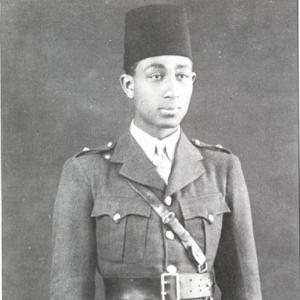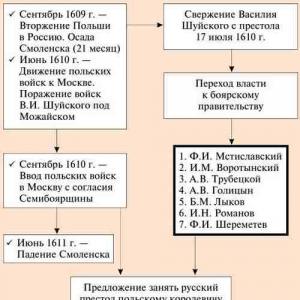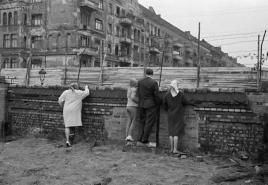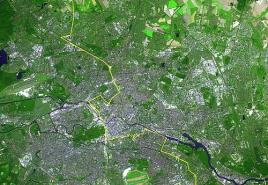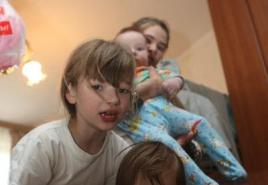English rule is. The use of the particle to before verbs in English. The difference between the particle to and the preposition to in English
The verb To Be is the most common verb in the English language.
Today we will analyze:
- how does it translate
- forms of the verb To Be,
- how and where to use the verb To Be,
- rules and examples
- verb To Be in all tenses.
If you are a complete beginner and just starting to learn English, first you need to understand what the verb to be is and in what cases it should be used. For a better understanding, I will give illustrative examples.
When the verb To Be is used - examples
When do we need to define:
- profession, age, relationship,
- your location, nationality,
- indicate the existence of something
- qualities of character
- color and properties of objects,
- state of mind or health,
- compare something / someone with something,
- indicate the actual process of action.
Examples:
I am a taxi driver, cook, director, translator, guy, citizen, etc.
She is my mother / sister / mother-in-law / friend / neighbor / good man/ in love / busy, etc.
He is kind/bad/smart/funny/stingy/funny/happy/sexy etc.
It/It is real/rainy/healthy/red/light, etc.
We are from Russia / in the park / at school / on the street / at work, etc.
They are better than.. / richer than.. / higher than.. faster than etc.
More examples of what can be said using the verb To Be
What's this? Who is it? Where are you?
This is my home. This is Russia. Here is my friend.
The water is ice cold. Roads are good. Today is Friday.
Tomorrow is my birthday.
A wonderful day! It's complicated.
Are you ready? This is dangerous?
Be careful.
Behave yourself.
Be happy.
Be a man!
She was right.
I will be a lawyer.
We were great!
I am reading /right now/
I'm driving / right now /
How to say all of the above in English, see the end of the article with translation.
Verb To Be NEVER not used with main verbs.
You can't say:
I am see. She is watch. He is go. They are work. We know.
I am see. She is watch. He is go. They are work. We know.
Verb To Be translation into Russian
The general meaning of the word To Be is to be, to be, to be, to be, to exist.
But directly when translating into Russian in the present tense, these words are usually omitted.
Examples of translation in the present tense:
1. I'm home = I'm at home. / I'm at home/
2. She is a doctor = She is a doctor. / She is a doctor /
3. It’s in Russia = This is in Russia / This is or exists in Russia /
In the future tense, the verb has the form: will be and translates as: I will, I will, I will.
In the past tense, the verb has the form: was / were and translates as: was, were, was.
I was happy = I was happy.
They were right = They were right.
It was rainy last night = It was rainy last night.
To Be verb forms and abbreviations
The verb To Be is very often abbreviated both in writing and in colloquial speech.
Remember these abbreviations and practice.
I am = I'm
You are = You're
He is = He's
She is = She's
It is = It's
We are = We're
They are = They're
Examples of affirmative sentences of the verb To Be
I am a girl. I am a girl.
You are a boy. You are a boy.
He is clever. He is smart.
She is my sister. She's my sister.
It is a cat. It's a cat.
It's me. It's me.
We are friends. We are friends.
They are students. They are students.
Verb To Be - negative sentences
To say:
I am NOT a taxi driver
- I'm not at home,
— she is not from Russia,
he is NOT evil
- this is NOT so - i.e. in a negative form, then after the verb To Be we put a particle - Not -
See examples and abbreviations
I am not = I'm not
You are not = You're not
He is not = He's not
She is not = She's not
It is not = It's not
We are not = We're not
They are not = They're not.
Verb To Be Examples of Negative Sentences
I am not tired. I'm not tired.
You are not a robot. You are not a robot.
He is not a driver. He is not a driver.
She is not rich. She is not rich.
It is not a dog. It's not a dog.
We are not ready. We are not ready.
They are not married. They are not married.
Verb To Be Interrogative sentences
To say:
- I am beautifull?
- He is good?
- They are from Russia?
- You are ready? - first we put the verb to be, then the pronoun.
See examples:
Am I..? Are you..?
Is he..? Is she..? Is it..?
Are they..? Are we..?
Am I nice? I'm good?
Are you tall? You are tall?
Is he your dad? Is he your dad?
Is she pretty? She's beautiful?
Is it a cat? It's a cat?
Are we kids? Are we children?
Are they students? They are students?
The verb To Be is an IRREGULAR verb.
This means that the verb changes its form not only depending on the gender of the noun, but also on what tense it is in.See examples below.
Verb To Be in all tenses
Below are the conjugation tables of the verb To Be in three main tenses: this is the Simple group - present, past and future. This is quite enough for the initial stage and up to the level of intermeddiate.
Conjugation of the verb To Be in the Present Simple
| Statement | Negation | Question |
| I am a doctor | I'm not a doctor | Am I a doctor? |
| You are a doctor | You are not a doctor | Are you a doctor? |
| He is a doctor | He is not a doctor | Is he a doctor? |
| She is a doctor | She is not a doctor | Is she a doctor? |
| It is a doctor | It is not a doctor | Is it a doctor? |
| We are doctors | We are not doctors | Are we doctors? |
| They are doctors | They are not doctors | Are they doctors? |
Conjugation of the verb To Be in the Past Simple
| Statement | Negation | Question |
| I was right | I wasn't right | Was I right? |
| You were right | You weren't right | Were you right? |
| He was right | He wasn't right | Was he right? |
| She was right | She wasn't right | Was she right? |
| It was right | It wasn't right | Was it right? |
| We were right | We were not right | Were we right? |
| They were right | They weren't right | Were they right? |
Conjugation of the verb To Be in the future tense Future Simple
| Statement | Negation | Question |
| I will be in Moscow | I will not be in Moscow | Will I be in Moscow? |
| You will be in Moscow | You will not be in Moscow | Will you be in Moscow? |
| He will be in Moscow | He will not be in Moscow | Will he be in Moscow? |
| She will be in Moscow | She will not be in Moscow | Will she be in Moscow? |
| It will be in Moscow | It will not be in Moscow | Will it be in Moscow? |
| We will be in Moscow | We will not be in Moscow | Will we be in Moscow? |
| They will be in Moscow | They will not be in Moscow | Will they be in Moscow? |
Verb To Be to form an action right now
In fact, the verb To Be is involved in the formation of the tenses of the Continuous group.
Examples:
I'm reading. I am reading (right now).
She is sleeping. She's sleeping now.
We are going to the movies. We are going / now / to the cinema.
I was watching a video. I watched the video.
They were walking down the street. They were walking down the street.
And the last
Interrogative words with the verb To Be
If the sentence uses interrogative words, then the interrogative word comes first, then the verb to be.
When will you be home? When will you be at home?
What is it? What's this?
Who is tired? Who is tired?
And now, fix the passed material.
Let's go back to our initial phrases that we speak in life.
Check yourself if you translated them correctly.
1. I am a taxi driver, cook, director, translator, guy, citizen.
2. She is my mother, sister, mother-in-law, friend, neighbor, good person, in love, busy.
3. He is kind, bad, smart, funny, mean, cool, happy, sober, sexy.
4. It/It is real, rainy, healthy, red, easy.
5. We are from Russia, in the park, at school, on the street, at work.
6. They are better than .. / richer than .. / higher than .. faster than ...
SEE HOW TO SAY IT IN ENGLISH
1. I'm a taxi driver. I'm a cook. I'm a boss. I'm a translator. I'm a guy. I'm a citizen.
2. She is my mother. She is my sister. She is mother-in-law. She is my girlfriend. She is my neighbor. She is a nice person. She in love. She is busy.
3. He is kind person. He is a bad person. He is smart. He is funny. He is stingy. He is cool. He is happy. He is sober. He is sexy.
4. It is real. It's rainy. It's healthy. It's red. It's easy.
5. We are from Russia. We are in the park. We are at school. We are outside. We are at work.
6. They are better than..
They are richer than..
They are higher than..
They are faster than…
More examples using the verb To Be with English translation
5. It's a wonderful day! It's difficult.
6. Are you ready? Is it dangerous?
7. Be careful.
8. Be good.
9. Be happy.
10. Be a man!
11. She was right.
12. I'll be a lawyer.
13. We were super!
14. I'm reading.
15. I'm driving.
- this is one of the cases when in Russian there is no direct, one hundred percent equivalent of the English construction, so its use often causes difficulties for beginners.
Meanwhile, turnover there is \ there are is used quite often not only in business or scientific language, but also in everyday everyday speech. This is one of the constructions that you need to use and understand without the slightest difficulty, on full automatic. Fortunately, its use is not difficult, the most important thing is to understand the meaning of this construction.
Meaning of the construction There is \ There are
Literally there is translates as “there is / is present”, and there are as “there is/are present” (plural). But it would be more accurate to say that there + to be is used to indicate the presence or presence of something or someone.
For example:
There is an old church in this town. There is an old church in this city.
There are ten or eleven kids in the classroom. There are ten or eleven children in the class.
There is always a way out. - There is always a way out.
There are two ways out of this tunnel. There are two exits from this tunnel.
What is the difficulty of the turnover There is \ There are?
The difficulty is that, as can be seen in the examples above, this construction is not translated into Russian in some single right way - you need to select a translation according to the meaning. The words themselves there is \ there are, as a rule, are not translated literally (“there is”), their meaning is conveyed by other means.
It can be the verb "to be", "to be", "to be present".
There is a nice pizza place in this mall. - In this mall there is good pizzeria.
There is only one player. Where are the others? - Here present only one player. Where are the others?
But in Russian, verbs like “to be” are often omitted.
Good, now there are all four players. Deal the cards. - Okay, here now. (there is) all four players. Hand over the cards.
What other door? There is only one door. What other door? Here (there is) only one door.
In general, you need to remember that if you want to say something about presence/absence object or person in some place, then often you can use the turnover there is \ there are.
There is a chair here. - There is an armchair.
There are many mirrors in this house. - There are many mirrors in this house.
Just don't confuse presence/absence with possession, with the case when we say that a certain person possesses something. In this case, the verb (to have) fits the meaning:
I have a chair. – I have an armchair.
I have many mirrors in my house. – I have many mirrors in my house.
The use of the turnover There is \ There are in tables with examples
The turn there is \ there are can be used in the affirmative (as in the examples above), negative and interrogative forms. It can also be used in different tenses: present, past and future. The tables below show examples of the use of there is \ there are in tenses Simple(Indefinite)
This turnover is also used in times Perfect(not used in Continuous and Perfect Continuous), but much less often than in Simple, especially in colloquial speech. Examples are given in the table at the end of this article, but this topic is “advanced”, and the turns themselves are of little use, some are practically not used at all even in written speech.
affirmative form
In the affirmative form, there is \ are used as follows:
| There is \ there are in the affirmative form | ||
|---|---|---|
| Singular | Plural | |
| present simple | There is
|
There are
|
| past simple | There was
|
There were
|
| Future Simple | There will be
|
There will be
|
Sometimes several items are listed in a sentence, with the first being in the singular and the second in the plural (or vice versa). In this case, the turnover there + to be agrees in number with the noun that comes after it.
For example:
There is a small box and two bigger boxes. Here is a small box and two larger boxes.
The noun in the singular comes first, so the verb is also in the singular - there is.
There are two big boxes and one bag. There are two large boxes and one bag.
The first in the list is a plural noun, the verb takes the corresponding form - there are.
negative form
The negative form can be built in two ways:
1. Using the particle not.
In this case, abbreviations are usually used: there is not = there isn’t, there was not = there wasn’t, there were not = there werent’, there will not be = there won’t be.
There isn't a chair here. - There is no chair here.
If after not there is a countable noun in the plural or an uncountable noun, then the pronoun is added - not any.
There aren't any chairs here. - There are no chairs here.
There isn't any oil here. “There is no oil here.
After no goes a noun without an article or a pronoun any.
There is no chair (chairs) in the room. There is no chair(s) in the room.
There is no oil here. “There is no oil here.
There is a slight stylistic difference between these options, understandable to native speakers. In addition, some set expressions are used either with no, or with not simply because it is the way it is.
There is no point in doing this! “There is no point in doing this!
It is generally believed that negation not more categorical, but in fact it all depends on the context, the situation. In my opinion, no matter how you say no or not, you will be understood in any case.
| There is \ there are in negative form | ||
|---|---|---|
| Singular | Plural | |
| present simple | There is no \ isn't
|
There are no aren't
|
| past simple | There was no \ wasn't
|
There were no wasn't
|
| Future Simple |
|
There will be no
|
Interrogative form
To build an interrogative form, you need to rearrange the verb to be at the beginning of the sentence.
| There is \ there are in interrogative form | ||
|---|---|---|
| Singular | Plural | |
| present simple | Is there..?
|
Are there..?
|
| past simple | Was there..?
|
Were there..?
|
| Future Simple | Will there be..?
|
Will there be..?
|
Video lesson on the topic There is \ There are
The topic There is \ There are is explained in sufficient detail and is very accessible in the video tutorial on Puzzle English. I remind you that on this service for learning English, you can not only watch free video lessons, but also go through exercises (composing phrases).
Turnover There is \ There are in Perfect tenses (for advanced level)
Attention: this topic is very difficult, advanced and full of nuances. It is by no means for beginners. I provide a general overview of it for informational purposes only.
This turnover is sometimes used in Perfect tenses, though much less often than in Simple tenses, especially in colloquial speech. To complete the picture, I will add a table of use there is \ there are in Perfect. It makes sense to study it only if you already know what it is:, and understand what the features of their meaning are.
As in the above types of temporary forms, in constructions like There has been, we are talking about an action that took place before the moment of speech, the result of which is relevant at the moment of speech.
|
affirmative form |
||
|---|---|---|
| Singular | Plural | |
| Present Perfect | There has been
|
There have been
|
| past perfect | There had been
|
There had been
|
| Future Perfect | There will have been
|
There will have been
|
| negative form | ||
| Singular | Plural | |
| Present Perfect |
|
There has been no\hasn't been
|
| past perfect | There had been no \ hadn't been
|
There had been no\ hadn't been
|
| Future Perfect | There will have been no
|
There will have been
|
| Interrogative form | ||
| Singular | Plural | |
| Present Perfect | Has there been..?
|
Have there been..?
|
| past perfect | Had there been..?
|
Had there been..?
|
| Future Perfect | Will there have been..?
|
Will there have been..?
|
The more you begin to appreciate and love your usual native Russian language. It seems to us that in Russian there are no confusing tenses, no regular/irregular verbs, no articles. Everything is simple and clear. But this, of course, is not the case. And the Russian language has enough of its complex rules and confusing definitions. In this article, we will look at the slightly confusing there is/are construction, which is rather unusual because it appears at the beginning of a sentence and is usually not translated in any way.
How and when to use there is/there are?
We use this construction when we need to say about the location any subject. That is, about what something (someone) somewhere located. We must immediately remember that we always put it at the beginning suggestions. I think you have already guessed that we use there is when we are talking about one subject, and there are about several.
Literally, we translate the first sentence as follows: "There is (is) book on the shelf. Of course, in Russian it sounds ugly, and in real life no one speaks like that. But at the first stage it is important to understand meaning what we say .
This literal translation will help you speak correctly and, most importantly, understand the logic of this construction. But when you say this turnover many times and you don’t have to translate it verbatim, then you can move on to a beautiful literary translation: There are two books on the shelf.
Order of words in a sentence
with there is/are
Don't forget to put "there is/there are" at the beginning when you talk about the location of something. This will help your interlocutor to understand from the very beginning that it is about finding something somewhere. In such a sentence, each word is in its specific place. Let's look at the word order in a sentence.
| 1 place | 2nd place | 3rd place | 4th place |
| There | be (in the correct form) | What (who) is | Where is |
| There | is | a cat | in the room |
| There | are | cats | in the street |
Negative form c there is/are
The negative form is formed by adding a particle not. It is used when you want to say that something no / was not / will not be anywhere. We can cut there is not = there isn't and there are not = there aren't.
Also with the construction there is / there are the word is often used no (No). But abbreviations are not allowed in such phrases, because not is a particle that can be abbreviated, and no is already a word that cannot be abbreviated.
How to ask questions with there is/are?
The construction of questions with this construction is subject to the standard rules of the English language. To ask a question, it is enough to move the words is / are to the beginning of the sentence, before the word there. Consider an example of how to make an interrogative sentence from an affirmative sentence.
Statement
Question
Positive answer will look like this.
At no answer we add the not particle.
Let's look at one more example to confirm.
How to ask questions using question words?
With the turns there is / there are, you can also build sentences using question words. Here is some of them:
- what - what
- which - which,
- why - why,
- how long - how long,
- when - when.
In such questions, we put these words in the first place, and then the sentence is built as in a simple question.
There is/are in past and future tenses
 If you want to say about something that was or will be somewhere, then for this it is enough to change word form is/are (verb be). How this verb changes, we will consider in great detail in the next article. For now, just remember that to change the time using the there is / are construction, you need to change the verb.
If you want to say about something that was or will be somewhere, then for this it is enough to change word form is/are (verb be). How this verb changes, we will consider in great detail in the next article. For now, just remember that to change the time using the there is / are construction, you need to change the verb.
Since the phrase there is/ there are is mainly used to say where is this or that object, then you can easily practice using this construction. Take a look around. What do you see? Where are the things you are used to? So there is…
- Use is with objects in the singular and are with things in the plural.
- After collective nouns, it is usually used is, but you can use are if you need to select individual objects that belong to a group.
- After phrases like a number of… the plural verb is usually used.
To decide what to use is or are, look at what number the noun is in, singular or plural. If the noun is singular, use is. If it is plural or more than one noun in a sentence, use are.
The cat is eating all of his food. The cat eats everything that was given to her.
The cats are eating all of their food. - Cats eat whatever they are given.
The cat and the dogs are eating as fast as they can. The cat and dog eat as fast as they can.
These are the most basic grammar rules for using is and are.

Is vs. Are with collective nouns
A collective noun refers to a group of people or things that are treated as a unit in speech. Word committee (Committee) is a collective noun. A committee implies many people, but the word itself is unique in form. In American English, collective nouns are used with is. In British English, collective nouns can be used with is or are.
The committee is considering the budget right now.- At the moment, the commission is considering a financial issue.
The audience is getting antsy. Those sitting in the audience become restless.
The couple is moving to California. This couple is moving to California.
But even in American English, the collective noun can be used with are when it is necessary to focus on individual members of the group.
The couple are keeping secrets from each other. This couple keeps secrets from each other.
Is vs. Are with uncountable nouns
Real nouns (also called uncountable nouns) are like collective nouns. They refer to things or objects that cannot actually be counted. Water and sand are uncountable nouns. Uncountable nouns are used with is in both British and American English.
The sand is too hot to walk on! The sand is too hot to walk on!
Water is our most precious resource.“Water is the most valuable resource.
Pudding is very easy to make.- Pudding is very easy to make.
Is vs. Are with phrases a Number of / a Pair of / a Group of
Collective phrases like a number of or a pair of make you wonder what to use, is or are. What verb should be used when we talk about phrases like a number of people? One side, number is a singular noun that suggests the use of is. But people is the plural, which suggests the use are. Generally it's better to use are with the phrase a number of. You may accidentally run into a person who disagrees with this, but the choice is yours.
A number of people are concerned about the lack of progress. Many people worry about the lack of progress.
A number of people are concerned about the lack of progress.
Other collective phrases like group of can be used with is when the focus is on the group:
That group of protesters is sure to be distracting. This group of demonstrators is sure to create a distraction.
This series of books is phenomenal. This series of books is just phenomenal.
But also can be used are when the focus is on individuals.
A bunch of my friends are going to different schools next fall. — A bunch of my friends are going to go to different schools next fall.
A handful of new books are published each week. A small number of new books are published every week.
When we talk about pairs, we usually mean two things as a unit, so it's common to use is.
A good pair of shoes is a luxury in some parts of the world. A good pair of shoes is considered a luxury for people in some parts of the world.
Not properly: A good pair of shoes are a luxury in some parts of the world.
There Is vs. There Are
When we make a choice between there is and there are, it is necessary to pay attention to what follows these constructions.
In the sentence above, the word cat stands in the singular, so the construction is used there is.
There are many opportunities to learn from this company.
In the sentence above, the word opportunities in the plural, so used there are. (And don't let the word many confuse you - focus on the noun.)
Verb be (to be)
present tense has three forms: am, is, are:
am
used only with a pronounI
(I).
is
- with nounsin the singular.
are
- with nounsin plural
. Pronoun you in English it is always plural, although it can be translated into Russian as "you" or "you".
Verb declension table to be in present simple tense:
| I am | am | (not) (not) |
fine. |
| He he/She she/It it | is | ||
| We/You/You/They/They | are |
| I "m | ||
| abbreviations: | He's | |
| You"re |
I (am) a student. He (is) a student. Are you student. They are students.
I "m
not hungry, but I "m thirsty.
I'm not hungry, but I'm thirsty. (thirsty - adjective)
Christy(she) is my niece.
Christy is my niece.
The weather is
n "t
very nice today.
The weather today is not very pleasant.
kittens(they) are very funny.
Kittens are very funny.
My sister and I(we) are big fans of Lady Gaga.
My sister and I are big fans of Lady Gaga.
"Game of Thrones"(it) is the most expensive TV show.
Game of Thrones is the most expensive series ever.
In the interrogative sentence am, is, are are placed before subject. (In a declarative sentence, the verbs am, is, are come after the subject).
| Am | I | fine? | yes, I am ./No, I "m not. |
| Is | he/she/it | yes, he is ./No, he is n "t. | |
| Are | we/you/they | yes, we are ./No, we are n "t. |
Are are you busy? - No, I "m not. I "m free now.
You're busy? - Not. I am free now.
Am I right? - No, you are
n "t. You are wrong.
I'm right? - Not. You're wrong. (wrong - adjective)
Where is my rucksack? Your rucksack (it) is under the desk.
Where is my backpack? - Your backpack is under the table.
how old are your children (they)? - My son (he) is 8 and my daughter (she) is
6.
How old are your children? Son is 8 and daughter is 6.
The pie is so delicious. Is the recipe difficult?
This pie is so delicious. Is his recipe complicated?
The use of the verbs am, is, are:
For the Russian language, the use of the verb "to be" in the present tense is uncharacteristic, and is omitted in translation. And in English, the verb to be is very important, because it is linking verb- connects different parts of speech (2 nouns, a noun and an adjective, a pronoun and a noun). Otherwise, the sentence is not complete in meaning: Our daughter is a biologist. - With a literal translation, everything is in order - Our daughter is a biologist. But in English without the verb is, this sentence is grammatically incorrect, since it is not clear how the daughter and the biologist are related. In order for the daughter to "become" a biologist, these two nouns must be combined with the verb is - Our daughter is a biologist. - Our daughter (is/is) a biologist.
Remember! Sentence in English cannot exist without a verb, therefore, if there is no semantic verb in the Russian sentence, then in this sentence in English it is necessary to use the linking verb "to be", i.e. am, is or are:
Klaus comes from Germany.
Klaus is from Germany. (come - semantic verb - the verb is is not needed)
Klaus is from Germany.
Klaus from Germany. (without is, the sentence will remain without a verb)
You look beautiful!
You look great! (there is a look verb)
You are beautiful.
You are wonderful! (no semantic verb)
This dog seems very clever.
This dog seems to be very smart. (there is a verb seem)
This dog is very clever.
This dog is very smart. (no semantic verb)
Note! Some Russian verbs are translated into English by adjectives with the verb to be: late (late), tired (tired), ill (sick), angry (angry), afraid (afraid), thirsty (thirsty).
I "m too tired to cook.
I'm too tired to cook.
why are you always late?
Why are you always late?
I don't understand why she is angry with me.
I don't understand why she's mad at me.
My son and husband (they) are ill.
My son and husband got sick.
little kids are often afraid of the dark.
Young children are often afraid of the dark.


